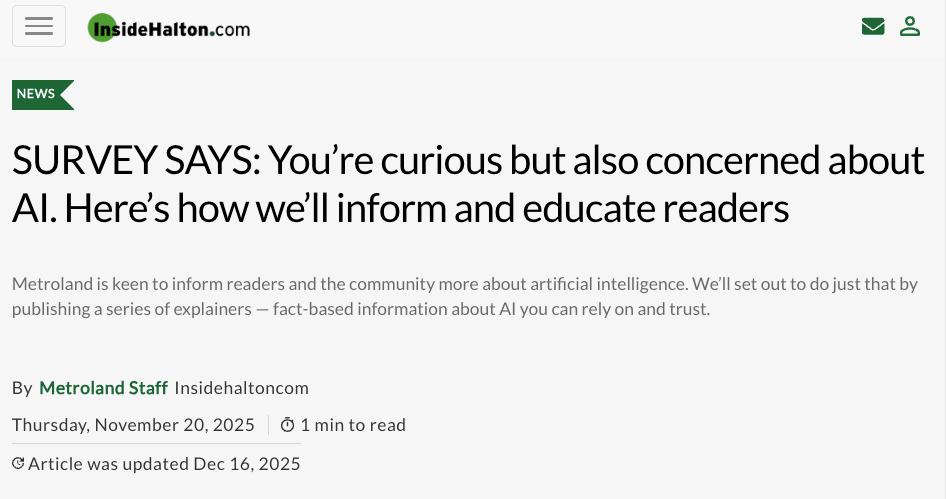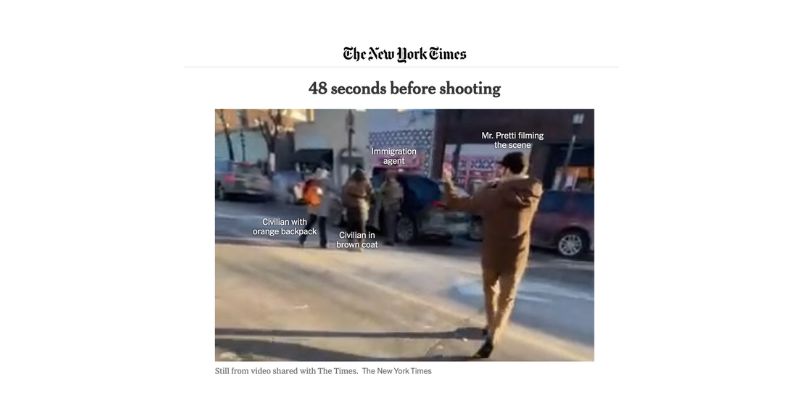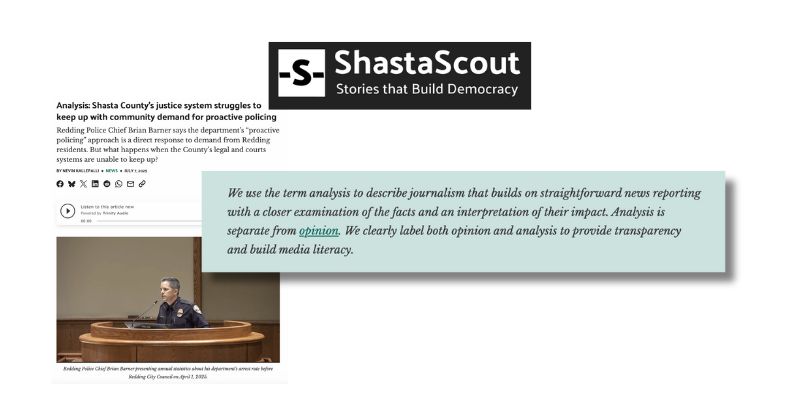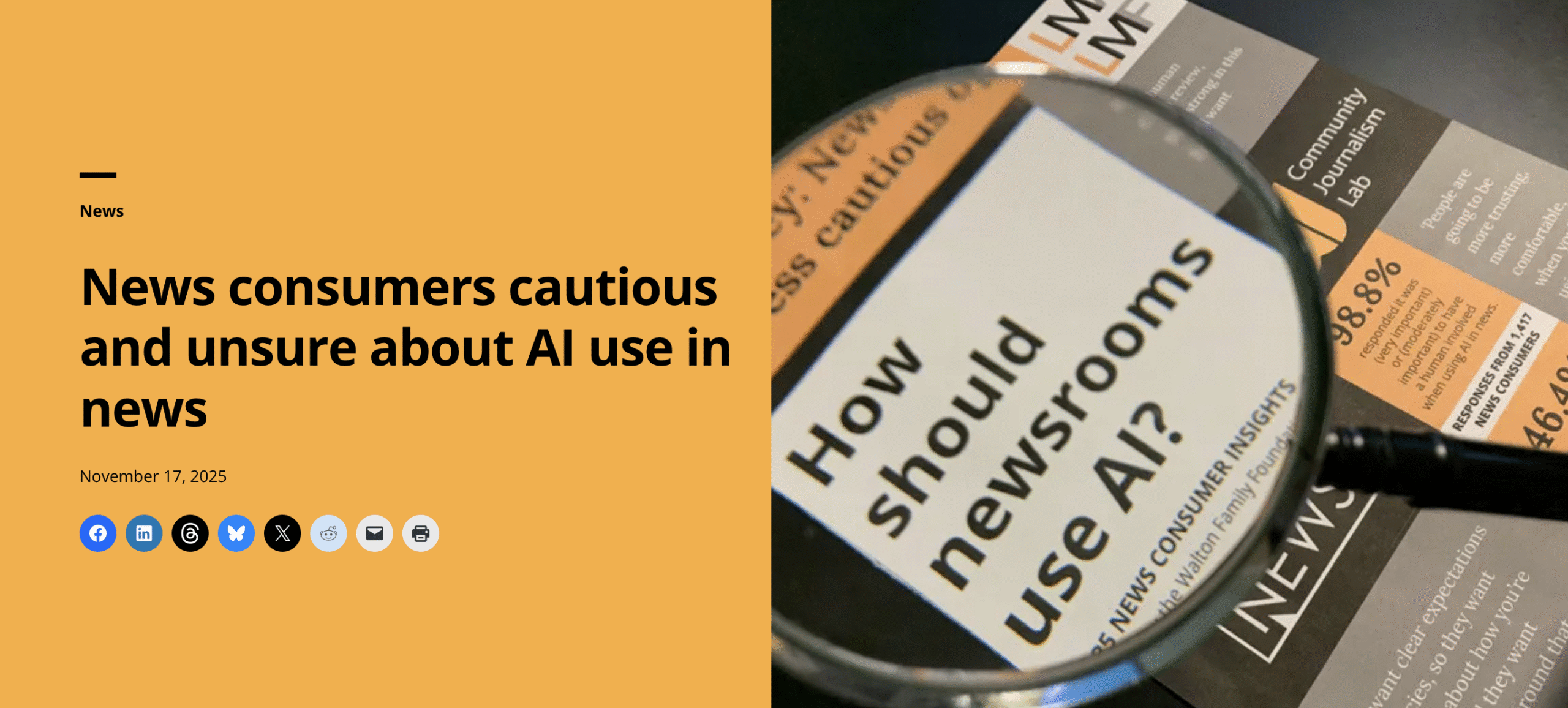
Our survey and community interview guide can help
Ask your community about the use of AI in your journalism
Note: This research is the first step in a year’s worth of work we have planned focused on AI disclosures and ethics, funded by a grant from the Patrick J. McGovern Foundation. There is a lot to learn, and future research might point to different solutions. But at Trusting News, we believe in learning in public, and sometimes that means sharing knowledge as it iterates. To follow our work on this topic, fill out this form.
People have varying comfort levels with how journalists use Artificial Intelligence. In addition, people want journalists to engage with them about AI and new technologies while helping them better understand and detect its use in news content and other information spaces.
Previous research has highlighted this but after working with a cohort of journalists this summer, Trusting News is learning new insights into what news consumers expect from journalists when they use AI and the importance of engaging with individual news consumers and communities about the use of AI in news content.
In July and August, we helped 10 newsrooms survey their audience about AI. Trusting News created the survey for newsrooms to use, drawing on previous research and journalist feedback about transparency and disclosure. The goal was to better understand news consumers’ comfort levels with how journalists use AI and to gather insights on what should be included in disclosures.
Based on this work Trusting News is recommending that journalists:
- Disclose the use of AI and find ways to explain why AI was used and how humans reviewed/fact-checked for accuracy and ethical standards
- Engage with their audience on the topic of AI
- Invest in educating their communities about AI
- Practice and show responsible AI use in their news products
We will be digging deeper into our recommendations for disclosure and education in upcoming editions of Trust Tips. If you’re eager to see some of our recommendations now, check out our new AI Trust Kit.
Suggestion #1: Survey your audience
Collectively, the newsrooms in our cohort gathered more than 6,000 survey responses. They shared the survey with their audiences by adding the survey link to stories, newsletters and social posts. Learn more about how the newsrooms distributed the survey here.
Some of the questions from the survey include:
- How specific should explanations about our newsroom’s use of AI be?
- Is knowing why we decided to use AI in our reporting process important to you?
- Would it be useful if our newsroom provided information and tips to help you better understand AI in general and detect when content has involved the use of AI?
While the results were similar to what previous research has found related to people’s comfort level with the use of AI in news, each newsroom’s individual data painted a specific picture around comfort level and expectations in their community. These specifics can help the newsrooms decide how to move forward using AI. Of course, newsrooms don’t need to ask their audience’s permission to do anything, but if we want to maintain trust or not lose it further, taking into consideration our audience’s comfort level with the use of AI could go a long way.
Consider this example from ARLnow.
The newsroom was sometimes using AI to create images when they did not have actual photos to fit with a story. The newsroom received feedback from their audience expressing discomfort with this practice, so the newsroom decided to ask the audience if they were comfortable with AI being used in their news coverage this way.
While a majority said they were, 48% said they were not, so the newsroom said it would stop this practice and instead, commission “human-created illustrations for the real estate and local business stories for which AI images were previously used.” While sharing this news they also shared the 10 ways they are using AI in their news process.
We hope you’ll consider asking your community about the use of AI in your journalism. To help, we’re making the full survey available so you can replicate it in your community. Click here to make a copy of it for your own use.
Suggestion #2: Talk to community members one-on-one
In addition to the survey, the journalists in our cohort were asked to interview 10 of their news consumers to gather deeper insights into perceptions of AI use and understanding of the technology.
Research shows journalists simply taking the time to talk and listen to people builds trust and goodwill. So, we decided to create questions to guide journalists through one-on-one interviews with community members about the use of AI. The focus of the questions was for journalists to hear more about individual people’s knowledge of the technology, comfort level with use of it and what kind of expectations they have around disclosure of the use of AI in news content.
Some of the questions in the guide include:
- Is there anything you’re afraid of when it comes to us using AI?
- When we use AI what do you want to know about that use
- When thinking about a new organization’s use of AI, how important is it to you that a human was still involved in the process or looked at the content before it was published?
When the group of newsrooms used the interview guide some themes they learned include:
- Interviewees were cautious about AI’s role in journalism, expressing concerns about its accuracy and potential to remove human jobs. (The concern over job loss in newsrooms came up often during these one-on-one interviews.)
- Interviewees seem less willing to accept AI work that replaces humans and more accepting of AI work that increases efficiency for journalists.
- The term “AI” can bring up negative feelings on its own, which can impact the overall feelings people have about the use of the tool(s).
- Journalists found people expressed discomfort with “AI” when mentioned more generally but felt more comfortable when asked about specific uses of it by journalists. One journalist said, “ambiguity breeds mistrust, specificity cures it.”
- People feel human oversight is essential when AI is involved, emphasizing the importance of ethical and accurate AI usage.
- People want to see policies disclosing use of AI on news organization websites and said explainers on how newsrooms are using AI or could use AI would be useful.
- Many want newsrooms to disclose AI use on an article-by-article basis, like in footnotes or as part of the content.
- Interviewees were supportive of newsrooms providing educational resources about AI. Some said newsrooms could offer workshops, guides, or articles explaining AI’s role in reporting.
A lot of the journalists used the survey to find people to talk with about this. As with any story, the journalists found actually getting someone on the phone was more difficult than sending one email or text. So, you definitely will want to be persistent and reach out to more people than you want to talk to.
View the complete community interview guide here. For more tips on finding people to talk to check out the AI Trust Kit.
Trusting News would like to thank the journalists and newsrooms who helped us with this work. We would not be able to make these recommendations without their help. If your newsroom, company or journalism support group would like help engaging your community about the use of AI in news, send us a note: info@TrustingNews.org.
Some of the newsrooms used AI to transcribe or summarize their one-on-one interviews with community members. Those summaries and transcriptions were provided to Trusting News and some were included in this Trust Kit. In addition, Trusting News used AI to help analyze the collective interview response summaries and only included takeaways we verified to be accurate. Using AI allowed us to more quickly analyze the data, which enabled us to provide results to the journalism industry more quickly. To read more about our approach to using AI, click here.We’d love to see examples of how you’re doing this, or working to build trust with your election coverage more generally. Let us know by hitting reply, or reach out on LinkedIn or X. How have you explained your approach to fact-checking? Let us know here, on LinkedIn, X or email at info@trustingnews.org.

Assistant director Lynn Walsh (she/her) is an Emmy award-winning journalist who has worked in investigative journalism at the national level and locally in California, Ohio, Texas and Florida. She is the former Ethics Chair for the Society of Professional Journalists and a past national president for the organization. Based in San Diego, Lynn is also an adjunct professor and freelance journalist. She can be reached at lynn@TrustingNews.org and on Twitter @lwalsh.



